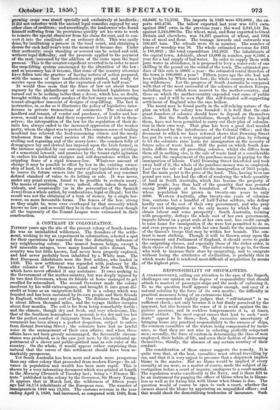FENCES OF THE LAW.
WEE our ears are stunned by the clamorous demands of the Irish Tenant-Right Leaguers for legislative protection against their own imprudence in bargain-making, it may be useful to employ our minds in a cursory examination of the value of some of those fences with which the law has already encircled private interests in Ireland. A correspondent, writing from a remote district of that kingdom, calls our attention to a case in point, the develop- ment of which will probably seem strange to English readers, who remember that its peculiar features were not alluded to by Irish Representatives, upon either side, during the stormy discus- sions of tenant and landlord rights and wrongs that marked the close of the last session of Parliament. " Certain patriots," says our informant, " plumed themselves much upon their success in resisting the attempt made by the House of Lords to remove the protection afforded to the dishonesty of tenants by the recent act for preventing the execution of distress for rent upon growing crops. They saw with philanthropic satisfaction the opportunity given by that novel law for a Sabbath-day's work in cheat- ing the -landlord and the rate-collector ; but they did not see or did not tell of the reactionary mischief it caused to the unfortunate tenant exposed to the temptation of its fatal faci- lity for fraud. The statute for the prevention of the seizure of
growing crops was aimed specially and exclusively at landlords ; it did not interfere with the ancient legal remedies enjoyed by any other class of creditors ; and accordingly, the landowner who found himself atiffering from its provisions quickly set his wits to work to reinefsle ;the! special &arida. from his claim for rent, and to con- vert it into the similitnde of an ordinary debt. This was easily done rhy hist:hitting lilpriiceke• in the lo court, and obtaining a deeiviefor each half rent the moment it became due. Under that.stithoritr, crops standing or`severed can be seized and sold, withilut legal difficulty, and the proceeds applied to the payment
. the rent,,,;inereaSed by the addition of the costs upon the legal procesk This is the counter-expedient" reverted to in order to meet the eropLlifting system encouraged by the alteration of the laW and senebestiary has it become, that some of the country attornies hive-fallen into the practice of "having notices of action prepared, with the names of their landlord-clients printed, and ready for service upon the occupiers at the expiration of each half-year."
It would thus seem that the fence of law set about tenant roguery by the philanthropy of certain lackland legislators has turned out to be nothing better than a decoy, which has, no doubt, brought within the costly meshes of the law many an unsuspecting tenant altogether innocent of designs of crop-lifting. The fact is instructive, in so far as it illustrates the policy of legislative inter- ference in private transactions of commerce. The relations of landlord and tenant, of vendor and purchaser, of lender and bor- rower, would no doubt find their respective levels if left to them- selves ; the interposition of the law for the regulation of their de- tails has always ended in the increased oppression of the weaker party,. whom the object was to protect. The common sense of trading mankind has relieved the food-consuming citizen and the needy tradesman from the cruel mercies of the statutes against fore- stalling and regrating and of the usury-laws: the common folly of demagogues lay and clerical has imposed upon the Irish farmer, in the instance specified by our correspondent, the wasting privilege of a semestrial lawsuit, and promises by the tenant right agitation to enclose his industrial energies and self-dependence within the crippling fence of a rigid tenancy-law. Whatever amount of change it may be possible to effect by law in the existing owner- ship of land, it is not within the power of any legislative authority to coerce its future owners into the application of any constant defined standard of value to its letting or sale. It was never, under any penal system, found to be possible to restrain usury. The means of praetieing it were, indeed, often taken from indi- viduals, and occasionally (as in the persecution of the Spanish Jews) from a whole nation; by confiscations, legal or illegal ; but the result was not the obtaining of a loan of money, by a single bor- rower, on more favourable terms. The fences of the law, strong as they might be, were ever overleaped by that necessity which knows no law; and so would they be in the case of land even though all the ingenuity of the Tenant League were exhausted in their construction.



























 Previous page
Previous page